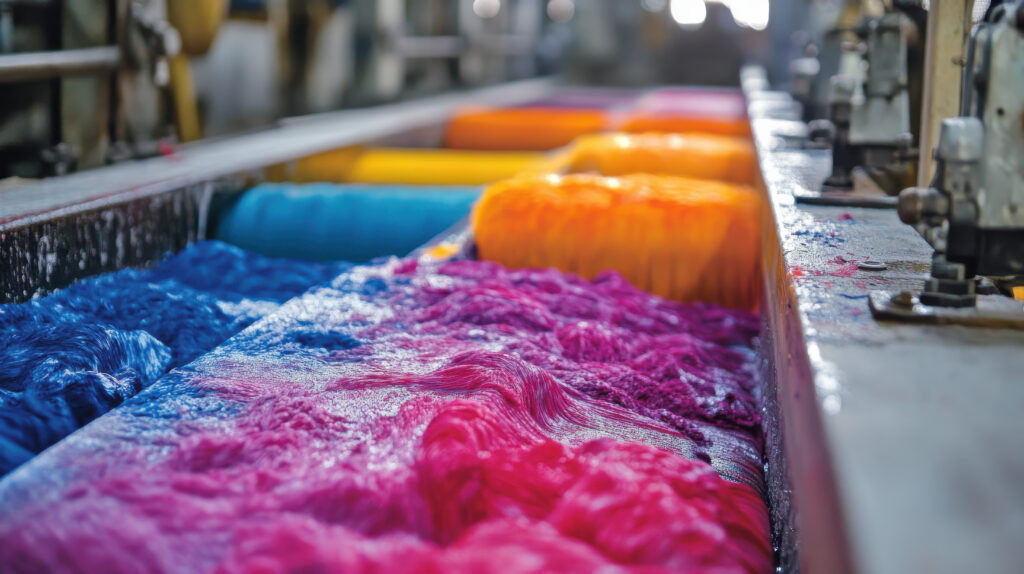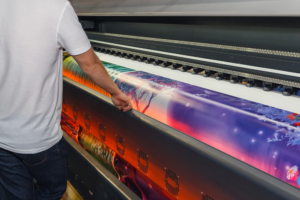Dyeing is a process that involves using dyes to apply colour to textiles using different methods. It begins with preparing the fabric to remove any impurities and apply dye using methods such as batch dyeing, printing, etc. To enhance the fabric texture and appearance, finishing treatments are carried out to remove the access dye. The usage of the type of dyes depend upon the fabric quality, type and the method used. The dyeing process is carried out using different types of textile dyeing machines, which are specifically designed for coloring materials such as yarn, fabric, and garments.
Let’s look into the different types of textile dyeing machine used in the textile industry.
Batch Dyeing Machine
Batch dyeing also known as exhaust dyeing, involves the gradual transfer of dye from a dye bath to the fabric using the same machinery. The various textile machines under this category are:
- Jet Machine: It uses high-speed jets to circulate dye liquor. It is generally ideal for polyester textile and aids in achieving uniform color. This is economical to use because of low liquor ratio.
- Skein Machine: This machine is used for dyeing yarns in skeins giving even dyeing all over. It is commonly employed in knitting and weaving.
- Jigger Machine: Jigger machine is suitable for dyeing of woven textiles and fabrics, upto boiling temperature without any creasing. This machine uses a large dye bath with two rollers and requires a low liquor ratio.
- Winch Machine: This is suitable for woolen fabrics and uses a high liquor ratio. In this process the fabrics are sewed together at the ends and are looped over the two wheels located on top of the dye vat.
Continuous Dyeing Machine
Continuous Machines are used for continuous processes. They are designed for long pieces of fabric, allowing for continuous dyeing in a controlled manner. The below are various types of textile dyeing machines for continuous process
- Beam Machine: This machine utilizes a beam of fabric wound onto a roller and then is loaded into a closed and pressurized vessel. This process is suitable for woven and knitted fabrics.
- Pad-Dry Machine: Pad dry machine uses a continuous roller steamer to diffuse dyes into the fabrics. This machine is commonly used for continuous dyeing process.
- Roller Machine: It features engraved rollers that apply dye to the fabric in a pattern. This kind of machine is suitable for printing and continuous processes.
Printing and Specialty Machine
Printing and specialty machines are specialized equipment used to apply colors and designs to fabrics in various ways.
- Dip Dyeing Machine: In this the fabrics, yarns, or textile products are immersed in a large dye bath. This is commonly used for tie-dye or gradient effects.
- Screen Printing Machine: This machine uses stencil to transfer ink onto the fabric and the ink is then pushed through the open areas onto the textile using a squeegee.
- Digital Printing Machine: It is a modern approach to the textile dyeing process. Digital print as the name suggests involves the use of digital printers enabling unique and detailed designs on the fabric.
Features and functional qualities of textile dyeing machines
- Uniformity and consistency: The color consistency is important when it comes to dyeing the clothes, and if larger batches are involved it becomes a little more difficult to ensure the same. With the use of textile dyeing machines the inconsistency in the colors is no more a problem. They ensure even distribution of dyes with minimal shade and variation, ensuring consistent quality and brand image. It is very crucial to get this factor as the textile industry is continuously bombarded with changing fashion and style, making it easier for the manufacturers to adapt without losing on the consistent quality.
- Customization: The changing consumer demands with regards to designs and patterns is important to take into account to sustain the textile business and stay updated. Textile dyeing machines can be customized to create specific shades and designs, and as we learnt above digital printing has got even more flexibility to print unique patterns.
- Efficiency: Textile dyeing machines comes in different types with each having its own pros and cons; with modern textile machinery proving more efficient than traditional ones. Jet dyeing machines for instance use less water, chemical and energy making them resource efficient with high production rate. Soft flow dyeing machinery is also an energy saver and aids in saving upto 50% of water consumption.
- Pre-dye fabric preparation: Before dyeing the fabric needs to be prepared by removing the impurities or residues so it doesn’t affect the dye uptake. Some dyeing machines have these pre-treatment functions built in, thus saving you from the hassle of multiple machinery maintenance.
- Versatility and sustainability: Textile dyeing machines are versatile in operations and can accommodate a variety of materials including natural cotton to synthetic fibres; this allows manufacturers to use a single machinery for multiple products. The new textile dyeing machines, apart from being versatile are also sustainable. They are designed for reduced water and dye liquor usage and are compatible for eco-friendly dyes.
Textile dyeing machines offers efficiency, precision, versatility and with growing advancements these machines are gearing up towards a sustainable and environment friendly approach. Manufacturers can stay competitive and get benefits from investing in the right type by assessing their needs and the output they are looking to produce. Embracing the innovative approach to the changing textile technology trends will meet the demands of both the consumers and the businesses.


